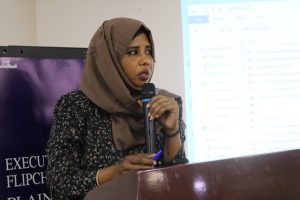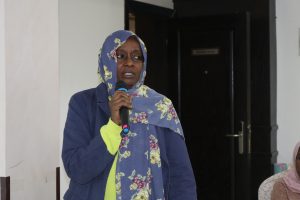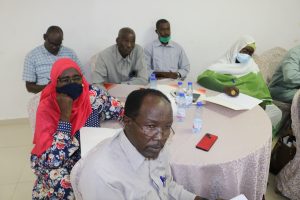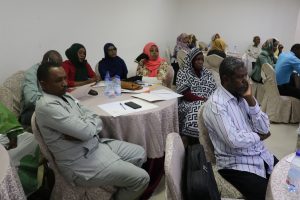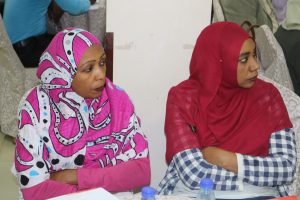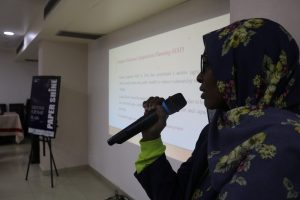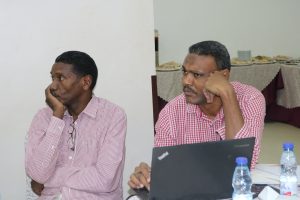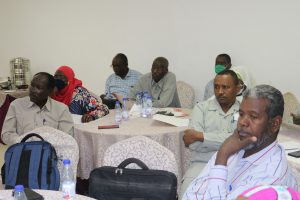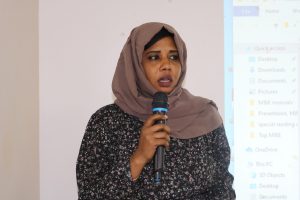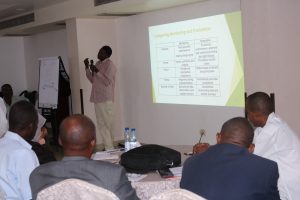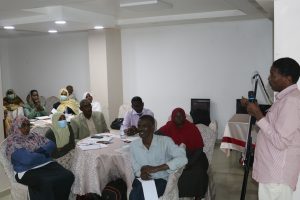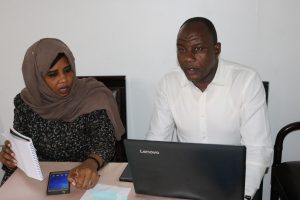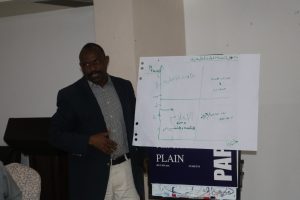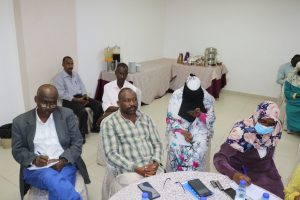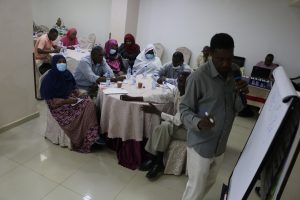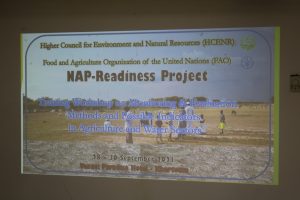https://iopscience.iop.org/article/10.1088/1748-9326/ad52b1/meta
NAP Readiness Project
https://link.springer.com/article/10.1057/eps.2011.7
A 3-day training workshop was organized in collaboration with Agriculture Research Corporation (ARC) during the period 22nd -24th of February 2022 at Paradise Hotel, Khartoum, aimed at:
The training workshop attended by 35 participants from the relevant governmental institutions, ministries, universities, representatives of the national technical committees and the researchers from ARC.
Lectures and hands-on-training as well as round tables discussions have been delivered in the field of crop production, crop modeling climate change impacts on the crop yields, soil properties and productivity under climate change and the socio-economic impact of the climate change on the crop productivity.
Lectures and hands-on-training as well as round tables discussions have been delivered in the field of crop production, crop modeling climate change impacts on the crop yields, soil properties and productivity under climate change and the socio-economic impact of the climate change on the crop productivity.
DG of ARC addressed the training workshop in the opening session and shared its thoughts about the importance of the crop modeling for Sudan in the climate change era.
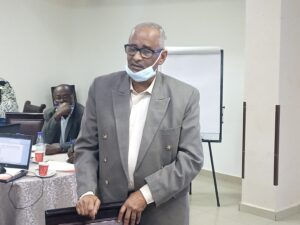
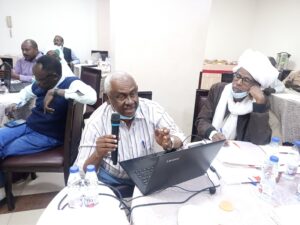
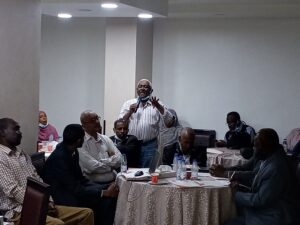
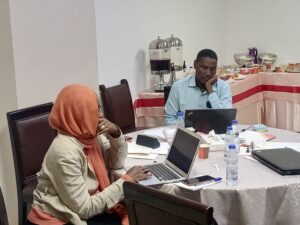
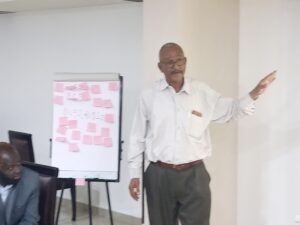
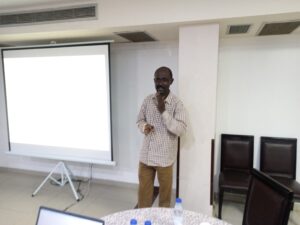
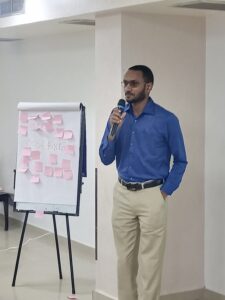
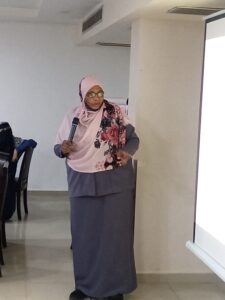
The government of Sudan represented by the Higher Council for Environment and Natural Resources (HCNER) has received fund from the GCF in support of National Adaptation Plan (NAP) Readiness through the Food and Agriculture Organization of the United Nations (FAO) under the programme titled “strengthening adaptation planning processes and capacity for implementation of adaptation actions in agricultural and water sectors in the Sudan”.
The NAP Readiness, with a focus on agriculture and water addresses gaps in the 2016 NAP of the Republic of the Sudan, including an identified lack of Climate Change (CC) data and information and impact assessments, well-designed training opportunities for Climate Change impact modelling at the State and federal levels, and Capacities of State-level Technical Committees for CC adaptation planning and implementation.
This project was prepared jointly by the FAO and the HCENR (GCF-National Designated Authority (NDA)/Focal Point (FP)), to support the generation of mid- to long-term CC projections and vulnerability assessments (and the national capacity to take on such task without external support in the future) and help to re-strengthening the State-level Technical Committees for CC adaptation (which provide the foundation for revising and updating the NAP 2016 in the future). This project will strengthen female representation in the State-level Technical Committees for adaptation planning and thus will lay the foundation for continuous equal participation of women in CC adaptation planning processes beyond this project. Beneficiaries will be the Technical Committees at state-level, smallholder farmers, pastoralists, NGOs, CSOs, and research institutions including Sudan Meteorological Authority (SMA), the Institute of Environmental Studies of the University of Khartoum, and Agricultural Research Corporation and the National Centre for Research.
The objective of this NAP Readiness Project is to strengthen climate change (CC) adaptation planning in the Sudan based on updated and reliable CC data. Data and information made available under this project will be absorbed and utilized through the 18 reactivated State-Level Technical Committees, which will operate in an inclusive participatory manner and inform the national-level adaptation planning (and implementation under Phase 2 of the GCF adaptation planning process) in the Sudan.
The project will be implemented by the Food and Agriculture Organization (FAO), which is an Accredited Entity (AE) to the Green Climate Fund (GCF), acting as a Delivery Partner (DP) for this Readiness project and working in close collaboration with the Higher Council for Environment and Natural Resources (HCENR) which is GCF NDA. The timeframe for the project implementation is two-year period from 2020 to 2022.
Objectives:
The overall objective of the capacity building training workshop is to support implement the project activity 2.1.1 through:
Course Period:
This course lasts for (3) three days from September 7 to September 9, 2021.
Venue: The course will be held in (to be determined later)
Target Audience:
This course targets members of the Technical Committees in all the states and agriculture and water sectors specialists, researchers in the universities and the specialized research institutions.
Number of Participants:
The expected number of participants is 54 participants.
| State | Description | |
| Participants | Secretariate | |
| Khartoum (Beneficiaries) | 14 | 4 |
| The other states (TC) | 36 | – |
Delivering Methodology:
Materials and Tools:
Pre-requirements:
The following are restricting criteria for participation:
Expected Outcomes:
After completing this course, the participant will be able to:
Training Instructor:
| Name | Position | Cell Phone | |
| Ammar Mokhtar Gomaha Gaber | National Consultant | ammar.gomahagaber@fao.org | +2249129995222 |
Training Workshop Agenda and Timetable:
| Day | First session
09:00 – 11:00 AM |
Breakfast – and Prayer
11.30 a.m. – 12:30 p.m. |
Second Session
12:30 p.m. – 02:30 p.m. |
Remarks |
| Tuesday
September 7, 2021 |
Registration and Opening Session | Climate Data: Sources and in-depth analysis
(Obtain and Analysis – Practical Session) |
Exercise
60 -90 minutes |
|
| Overview of Climate of Sudan and Agriculture | ||||
| Wednesday
September 8, 2021 |
Climate Variability and Climate Change impacts on Agriculture | Hands-on Analysis of Climate Data (Getting to know the CC information) | Practice
60 – 90 minutes |
|
| Thursday
September 9, 2021 |
Beyond Climate Maps: Usage of Climate Information in NAP | Climate Change Projections for Developing National Adaptation Plan (NAP)
+ Interpolation of CC Projections (Rainfall & Temperature) |
Practice
60 minutes |
Stationeries:
| No. | Item | Quantity | Total |
|
|
Flip charts | 5 | 5 |
|
|
Sticky Note (different colors) | 30 | 30 |
|
|
Markers | 5 packages | 5 |
|
|
Note books | 54 | 54 |
|
|
Pens | 54 | 54 |
The training workshop took place from 13th to 20th December, 2021, the first three days spend at the Sudan Meteorological Authority (SMA) premises to install the RegCM model and the rest at Paradise hotel from 16th to 20th December. The training was meant to build the capacity of the SMA to conduct climate change downscaling. The first three days involved the configuration of the models and tools needed for dynamical and statistical downscaling. The consultant had been informed beforehand that Food and Agriculture Organisation, Sudan (FAO-Sudan) had purchased three servers to be installed at the SMA premises. These servers would be used to perform the climate change downscaling tasks. The international consultant together with the SMA technical staff successfully installed the Regional Climate Model system (REgCM) regional climate model (RCM) and downscaled climate data for a few days. The training was then moved to the Paradise Hotel in Khartoum where the rest of the workshop was conducted.
The main objective of the workshop was to equip the SMA team with the knowledge and tools required to perform climate change downscaling using an RCM. The specific objectives required to achieve this were:
The participants had been well selected. There was a good balance between male and female. The participants were mostly young and running key operations at the SMA, therefore, they would be able to easily apply the knowledge learned to their duty stations.
Training Workshop Topics Summary
The following topics have been discussed and explained in detailed during the training period:
It was a lot of activity for 5 days so the consultant adjusted the training schedule to cater to this duration. The participants had to learn a lot in the few days, however, the consultant is confident they gained the skills needed to successfully perform climate projection downscaling on their own.
The participants should use the installed REGCM model to further understand how regional climate projection downscaling is conducted. The participants should run the model using different physics as initialization schemes and determine which best reproduces the observed rainfall and temperature in Sudan.
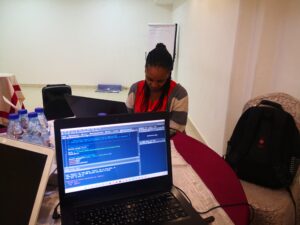
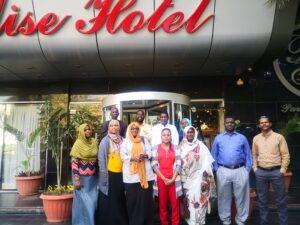
The overall objective of this training workshop is to support Outcome- 2 of the project (Strengthening national technical capacities) and project activity 2.3.2
Specific objectives of this training are to:
Time: This training will be conducted on 28-30 September 2021
Venue: Paradise Hotel – Khartoum
Target beneficiaries: This training is designed for 40 participants who will be selected from the agricultural and water sectors experts and other stakeholders, according to the following criteria:
The total number of beneficiaries will be 40 participants of experts in water and agricultural sectors two from each state (36 state participants from 18 states) 4 participants from stakeholders at the national level.
The expected number of audiences is 48 including participants and project support staff.
Methodology:
The training workshop will be theoretical and participatory practical learning-by-doing program, which simultaneously build capacity to produce results of immediate value. The workshop will include discussion and working groups. Participants during the introductory session will be asked by the facilitator about their expectation of the workshop, will be revealed when the facilitator presented the workshop objectives and compare them with the participants stated expectations to show participants awareness of reason about participation in the workshop.
Workshop content:
This training will cover the following topics:
Expected Outcomes:
After completing this course, the participant will:
Training Workshop on Monitoring and Evaluation Methods and Possible
Indicators in the Agricultural and water sectors
Project A planned intervention with a clear set to closely linked objectives usually
lasting no more than 5 years
Program A set of complementary projects designed to converge on outcomes at a
higher level of the results chain
Accountability The means by which people and organizations are held responsible for their
actions by having to account for them to other people.
Beneficiaries The people, networks, organizations, or institutions targeted by a
development intervention
Evidence The available body of facts or information indicating whether a belief or
proposition is true or valid.
Indicator A variable that measures progress towards intended result
Baseline study An analysis describing the situation prior to or at the start of a development
intervention against which progress can be assessed
Logic model A visual representation showing specific linkages between elements of
results chain
Findings Summaries, impressions, or conclusions reached after an examination or
investigation of data
Formative evaluation An early examination of an active programme with the aim of identifying
areas for improvement in its design and
performance. (Conducted during implementation)
Target A specific value imposed on an indicator
Project cycle The process and sequence in which a project develops from start to finish.
Or an approach describing the main tasks involved in managing a project
